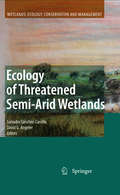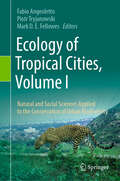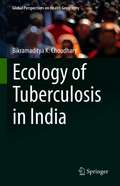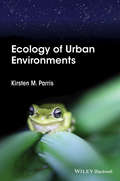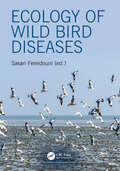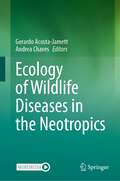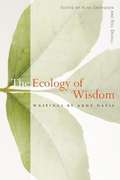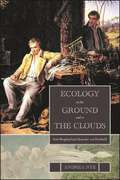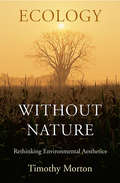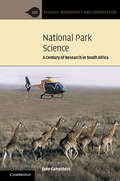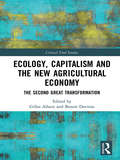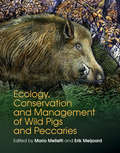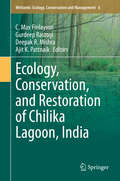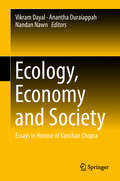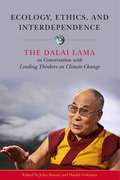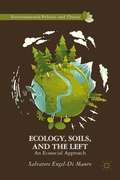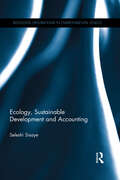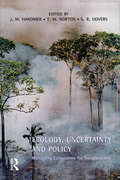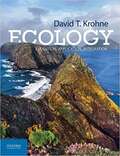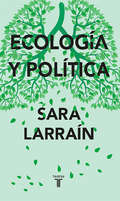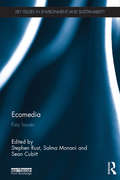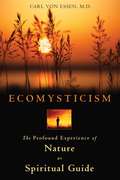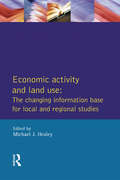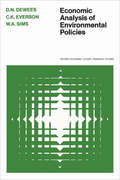- Table View
- List View
Ecology of Threatened Semi-Arid Wetlands
by David G. Angeler Salvador Sánchez-CarrilloPlaying a critical role in both influencing climate change and mitigating its impacts, the world's diverse wetlands have become one of the world's most threatened ecosystems as unsustainable land-use practices coupled with irrational use of water have already resulted in large-scale wetlands loss and degradation. To develop sound management and conservation schemes to assure wetlands sustainability in the long term requires long-term understanding of wetlands ecology. Yet until now, long-term interdisciplinary research into these systems has been limited to only a few systems from tropical or temperate climates (such as the Florida Everglades, and Czech biosphere reserve). This new book adds to the existing wetlands literature, providing a unique reference in basic and applied Mediterranean wetland ecology, based on results from long-term interdisciplinary research at the RAMSAR and UNESCO Biosphere site, of Las Tablas de Daimiel, Spain. Dating back to the early 1990s the research highlights changes in the biotic and abiotic environment in response to cumulative anthropogenic stressors, and provide guidance on applying this understand to sound management and conservation. With particular relevance to researchers dealing with semi-arid wetlands in the Mediterranean and elsewhere, as well as to resource managers, the book discusses the complexity of the interacting abiotic and biotic environment across different spatial and temporal scales and across various levels of biological hierarchy is highlighted, and reveals how management based on poor knowledge causes more damage than repair. The book will be of interest to researchers interested in freshwater ecology, hydrobotany, hydrology, geology, biogeochemistry, landscape ecology and environmental management.
Ecology of Tropical Cities, Volume I: Natural and Social Sciences Applied to the Conservation of Urban Biodiversity
by Piotr Tryjanowski Fabio Angeoletto Mark D. E. FellowesThis contributed volume addresses the global scale of urbanization and its impacts on biodiversity. By adding human capital, cities are incubators for new ideas and technologies, creating the possibility for socially and environmentally sensitive growth, but this is rarely seen. Urban ecology, an essential field that supports planning based on environmental perspectives, is a new science in tropical countries. This book discusses the social inequity embedded in tropical cities and explores how this inequity also materializes in biodiversity, with poor neighborhoods of tropical cities lacking sufficient access to green space, and therefore reduced access to the benefits of nature, and poor support for biodiversity. With the current biodiversity crisis, the traditional approach to protecting pristine areas is insufficient. The chapters in this volume illustrate how tropical cities can act as spaces for biological conservation. Ecological literacy can help cities reconcile the needs of both people and of nature. This book compiles studies by experts from more than 100 institutions and 29 countries on the ecology and biodiversity of tropical cities at multiple scales and applies their studies to urban planning and management. The audience for this book includes researchers, students, and professionals working on environmental, social, economic, cultural, political, architectural, and development projects in urban areas, offering a deep and timely discussion of their influence on the fauna and flora of tropical cities.
Ecology of Tuberculosis in India (Global Perspectives on Health Geography)
by Bikramaditya K. ChoudharyThe book addresses the issue of disease diffusion across the geographical span of India during the colonial period. Based on archival records, it analyses colonial economic policies and their implications for the spread of the disease across different regions of India as well as the role of the military in disease spread. It adds a new dimension to the understanding of the spread of TB in colonial India.The book also discusses the concept of the meaning of illness for different cohorts of TB patients. Based on narratives, it brings to readers the social and cultural dimensions that are responsible for the prevalence of the disease, despite having vaccination and medication available for more than half a century.The book will be beneficial to health and medical geographers and will bring new insights in historical geography as well as the history of medicine, by incorporating policy changes and their implication in disease spread. Sociologists and public health professionals will find narratives of patients interesting and useful for furthering their understanding.
Ecology of Urban Environments
by J. ParrisStudies the distribution, abundance and behaviour of organisms, their interactions with each other and with their urban environment Case studies with questions to improve retention and understanding Uses existing ecological theory to identify generalities and complexities in the urban ecosystems Discusses the urban ecology of humans, community-level, ecosystem-level, and population-and species-level responses to urbanization
Ecology of Wild Bird Diseases
by Sasan FereidouniThe book focuses on the ecology of the most important infectious diseases of wild avian hosts, especially those with high morbidity and mortality rates. Disease ecology is an important scientific approach to study the relationships and interactions between living organisms, their environment, and potential pathogens. Birds have high diversity, and the very special ability to fly and migrate. They migrate over long distances, and share ecosystems with other animals, even humans. They serve as the most important natural source of several pathogens with zoonotic potential. Bird-pathogen interactions are increasingly changing due to the continuous anthropogenic disturbances in habitats and ecosystems. With intensified climate change and improved environmental conditions for vectors, as well as higher susceptibility of avian hosts due to simultaneous exposure to environmental stressors (e.g., contamination, food limitation, etc.), the probability of emerging new infections and their expansion into new territories increase tremendously. The Covid-19 pandemic has shown that neglected ecological and epidemiological interactions between wildlife, domestic animals and humans are paramount to global health.The book has a different approach to understanding complex and multiscale interactions among various ecological factors for the most important infectious diseases of wild birds. It provides valuable data to students and everyone who deals with avian species including biologists, researchers, conservationists, and policymakers.
Ecology of Wildlife Diseases in the Neotropics
by Gerardo Acosta-Jamett Andrea ChavesThis contributed volume focuses on the Neotropical region, and explores the environmental, ecological and socio-economic components that facilitate the emergence of zoonotic diseases. This book highlights the primary ecological, environmental, social, and economic variables associated with the risk of maintenance, transmission, and dissemination of emerging, re-emerging, and neglected infectious diseases, in which Neotropical vertebrates are involved. It compiles up-to-date knowledge and research for the neotropical region, as well as discusses the current needs of knowledge improvement. The chapters include various examples of the cycles of infectious diseases, all with world-wide relevance where neotropical wild vertebrates are affected or involved.
Ecology of Wisdom: Writings
by Arne NaessA founder of the Deep Ecology Movement, Arne Naess' has produced articles on environmentalism that have provided unmatched inspiration for ecologists, philosophers, and activists worldwide. This collection amasses a definitive group of Naess' most important works in which he calls for nonviolent, cooperative action to protect the Earth. Rich with observations, insights, and anecdotes, Naess' writings draw from Eastern religious practices, Gandhian nonviolent direct action, and Spinozan unity systems. Playful and compassionate in tone, Ecology of Wisdom showcases Naess' exceptional enthusiasm, wit, and spiritual fascination with nature, while educating each of us about the steps we must take to rescue the planet and illuminating the relevance of this important environmental advocate.
Ecology on the Ground and in the Clouds: Aimé Bonpland and Alexander von Humboldt (SUNY series in Environmental Philosophy and Ethics)
by Andrea NyeIn Ecology on the Ground and in the Clouds, Andrea Nye raises a question: In a time of climate change and environmental crisis, where should we look for inspiration? Is it to Alexander von Humboldt, the "inventor of nature" who viewed the cosmos from the lofty peak of Mount Chimborazo? Or is it to Humboldt's travel partner, the botanist Aimé Bonpland, who left Europe behind for forty years of conservation, agroforestry, and cooperative farming in the newly independent Republic of Argentina? For Bonpland, order and harmony are not unveiled with European reason and insight; they are made on the ground by intelligent, honorable, and diverse working men and women. Cosmos is not a hidden balance of nature; it is order in thought and action that ensures what we do is coherent and for the common good. It is fair and efficient government, just adjudication of disputes, and good management. It is loving attention to intricate "cogs and wheels" of natural processes at the same time as imagining new forms of beauty and stability in human communities and working landscapes.
Ecology without Nature: Rethinking Environmental Aesthetics
by Timothy MortonIn Ecology without Nature, Timothy Morton argues that the chief stumbling block to environmental thinking is the image of nature itself. Ecological writers propose a new worldview, but their very zeal to preserve the natural world leads them away from the "nature" they revere. The problem is a symptom of the ecological catastrophe in which we are living. Morton sets out a seeming paradox: to have a properly ecological view, we must relinquish the idea of nature once and for all. Ecology without Nature investigates our ecological assumptions in a way that is provocative and deeply engaging. Ranging widely in eighteenth-century through contemporary philosophy, culture, and history, he explores the value of art in imagining environmental projects for the future. Morton develops a fresh vocabulary for reading "environmentality" in artistic form as well as content, and traces the contexts of ecological constructs through the history of capitalism. From John Clare to John Cage, from Kierkegaard to Kristeva, from The Lord of the Rings to electronic life forms, Ecology without Nature widens our view of ecological criticism, and deepens our understanding of ecology itself. Instead of trying to use an idea of nature to heal what society has damaged, Morton sets out a radical new form of ecological criticism: "dark ecology."
Ecology, Biodiversity and Conservation: A Century of Research in South Africa (Ecology, Biodiversity and Conservation)
by Jane CarruthersSouth Africa is renowned for its wildlife and environmental conservation in iconic national parks such as the Kruger, one of the world's first formal protected areas. However, this is the first book to thoroughly analyse and explain the interesting and changing scientific research that has been accomplished in South Africa's national parks during the twentieth century. Providing a fascinating and thorough historical narrative based on an extensive range of sources, this text details the evolution of traditional natural history pursuits to modern conservation science in South Africa, covering all research areas of conservation biology and all the national parks around the country. It reveals the interaction between the international context, government, learning institutions and the public that has shaped the present conservation arena. A complex story that will interest and inform not only those involved in conservation science of South Africa, but worldwide.
Ecology, Biodiversity and Conservation: Marine Ecosystems
by Crowe, Tasman P. and Frid, Christopher L. J. Tasman P. Crowe Frid, Christopher L. J.Ecosystem services are emerging as a key driver of conservation policy and environmental management. Delivery of ecosystem services depends on the efficient functioning of ecosystems, which in turn depends on biodiversity and environmental conditions. Many marine ecosystems are extremely productive and highly valued, but they are increasingly threatened by human activities. With contributions from leading researchers, this volume synthesises current understanding of the effects on biodiversity and ecosystem functioning caused by a variety of human activities and pressures at play in coastal marine ecosystems. The authors examine the likely consequences for ecosystem service provision, covering key topics including fisheries, aquaculture, physical structures, nutrients, chemical contaminants, marine debris and invasive species. Critically reviewing the latest developments, this is a unique resource both for environmental managers and policy-makers, and for researchers and students in marine ecology and environmental management.
Ecology, Capitalism and the New Agricultural Economy: The Second Great Transformation (Critical Food Studies)
by Gilles Allaire Benoit DavironWith increasing pressure on resources, the looming spectre of climate change and growing anxiety among eaters, ecology and food are at the heart of the political debates surrounding agriculture and diet. This unique contribution unravels agri-environmental issues at different spatial levels, from local to global, documenting the major shifts in agriculture from a long-term perspective. The book begins by exploring the changes in the industrialisation and socialisation of agriculture over time, through the lens of institutional economics including The French Regulation School and Conventions Theory. Building on Polanyi’s ‘Great Transformation’, the chapters in this volume analyse long-term and contemporary changes in agriculture and food systems that have occurred throughout the last few centuries. Key chapters focus on the historical changes in provisioning and the social relations of production, consumption, and regulation of food in different socio-political contexts. The future of agriculture is addressed through an analysis of controversial contemporary political claims and their engagement with strategies that aim to improve the sustainability of agriculture and food consumption. To shed light on ongoing changes and the future of food, this book asks important environmental and social questions and analyses how industrial agriculture has played out in various contexts. It is recommended supplementary reading for postgraduates and researchers in agricultural studies, food studies, food policy, the agri-food political economy and political and economic geography.
Ecology, Conservation and Management of Wild Pigs and Peccaries
by Mario Melletti Erik MeijaardWild pigs inhabit vast areas in Europe, Southern Asia and Africa, and have been introduced in North and South America, while feral pigs are widespread in Australia and New Zealand. Many wild pig species are threatened with extinction, but Eurasian wild boar populations, however, are increasing in many regions. Covering all wild pig and peccary species, the Suidae and Tayassuidae families, this comprehensive review presents new information about the evolution, taxonomy and domestication of wild pigs and peccaries alongside novel case studies on conservation activities and management. One hundred leading experts from twenty five countries synthesise understanding of this group of species; discussing current research, and gaps in the knowledge of researchers, conservation biologists, zoologists, wildlife managers and students. This beautifully illustrated reference includes the long history of interactions between wild pigs and humans, the benefits some species have brought us and their role and impact on natural ecosystems.
Ecology, Conservation, and Restoration of Chilika Lagoon, India (Wetlands: Ecology, Conservation and Management #6)
by C. Max Finlayson Gurdeep Rastogi Deepak R. Mishra Ajit K. PattnaikThis book chronicles the decades-long work of studying, analyzing, and reversing the environmental pressures that threatened India’s Chilika Lagoon, the largest brackish-water lagoon in the region, and the second largest in the world. Designated as one of India’s first Ramsar Sites in 1981, Chilika Lagoon continued to degrade for a decade longer. Then, the Chilika Development Authority (CDA) was established to gather information and devise a restoration plan that benefits the ecosystems of the lagoon, with sensitivity to the needs and livelihoods of local communities. Expert contributors detail the work of analysis, planning and implementation, including extensive coverage of such topics as: Devising a plan for implementing Ramsar wise use guidelines Sedimentologic, chemical, and isotopic impacts Hydrodynamics and salinity Runoff and sediment in watersheds of the Lagoon's Western Catchment Long-term analysis of water quality and continued water quality monitoring Bio-optical models for cyclone impact assessment Studies of geomorphology, land use, and sedimentary environments Spatiotemporal assessment of phytoplankton communities Creation of a post-restoration scenario for fish and fisheries Assessing status of waterbirds, species diversity and migration patterns The result was a major hydrological intervention to re-establish hydrological and salinity regimes, biodiversity, and fish catches, and help protect the livelihood of lagoon-dependent communities. The story of the rehabilitation and management of Chilika Lagoon demonstrates that it is possible to halt and reverse the encroachment and degradation of wetlands, to restore biodiversity and to provide benefits for large numbers of people. Ecology, Conservation, and Restoration of Chilika Lagoon goes beyond scientific research articles to explore institutional and governance issues, political ecology, and the Ramsar Convention’s guidelines for ecosystem restoration. The book will benefit researchers, wetland managers, government policy makers and more general readers concerned with restoration and conservation of wetlands around the planet.
Ecology, Economy and Society: Essays in Honour of Kanchan Chopra
by Vikram Dayal Anantha Duraiappah Nandan NawnThis book deals with not just complex linkages, interactions and exchanges that form the relationship between the economic activities, human society and the ecosystems, but also the influences and impacts that each causes on the other. In recent times, this ecology–economy–society interface has received unprecedented attention within the broader environment–development discourse. The volume is in honour of Kanchan Chopra, one of the pioneers of research in these areas in India. She has recently been awarded the coveted Kenneth Boulding Award by the International Society for Ecological Economics (ISEE) and is the first Asian to receive it. The four sub-themes of the book reflect some of the important areas in the environment–development discourse — sustainability of development, institutions and environmental governance, environment and well-being, and ecosystem and conservation. Within each of the sub-themes, the policy and the practice as well as the macro and micro aspects are addressed. With contributions mainly from ecological economists and ecologists, the book’s approach is interdisciplinary, both in spirit and content, reflecting the honoree's work, which went not just beyond the mainstream ideology of economics, but also the way she listened to ideas from disciplines like ecology and sociology. The volume also includes two reflective essays on academic life and works of Kanchan Chopra. The book is a valuable resource for students, teachers, researchers, practitioners and policy makers in the areas of development economics, ecological economics, environmental economics and related disciplines such as conservation, development, ecology, economics, environment, governance, health, sociology and public policy.
Ecology, Ethics, and Interdependence: The Dalai Lama in Conversation with Leading Thinkers on Climate Change
by Daniel Goleman Dunne D. JohnPowerful conversations between His Holiness the Dalai Lama and leading scientists on the most pressing issue of our time. Engage with leading scientists, academics, ethicists, and activists, as well as His Holiness the Dalai Lama and His Holiness the Karmapa, who gathered in Dharamsala, India, for the twenty-third Mind and Life conference to discuss arguably the most urgent questions facing humanity today: What is happening to our planet? What can we do about it? How do we balance the concerns of people against the rights of animals and against the needs of an ecosystem? What is the most skillful way to enact change? And how do we fight on, even when our efforts seem to bear no fruit? Inspiring, edifying, and transformative, this should be required reading for any citizen of the world.
Ecology, Soils, and the Left
by Salvatore Engel-Di MauroSoil degradation is real and global, even if the evidence is not so easy to glean. Degradation poses comparable risks to greenhouse gas emissions, deforestation, and nonhuman animal extinctions. Few have noticed soil degradation as the problem it has become, except most indigenous peoples in their struggles for survival.
Ecology, Sustainable Development and Accounting (Routledge Explorations in Environmental Studies)
by Seleshi SisayeAccounting literature has viewed sustainability in terms of social, economic and environmental performances. There have been concerns that the relationship between sustainability, accounting and organizational performance cannot be explained unless we can deduce patterns of administrative behaviour that chronicle management practices. Ecology, Sustainable Development and Accounting argues that, despite the broader social and economic development dimensions of sustainability and the limitations of its extension to corporate and organizational behaviour; an ecological framework is capable of providing the overall societal and community chronologies that describe corporate sustainable operations. Drawing examples from international development and federal government organizations, this book documents the link between ecology, corporate sustainable development, and sustainability accounting and reporting. It draws together the literature from several disciplines to elaborate the contribution of the ecological approach to sustainable development in the accounting literature. This book will be of particular interest to students, academics and practitioners in the areas of environmental studies, ecological economics, sustainable development studies, and social and environmental accounting. The sociological and anthropological perspectives make this book the first of its kind to apply the population ecology of sociology to both the sustainability and accounting literature.
Ecology, Uncertainty and Policy: Managing Ecosystems for Sustainability
by John HandmerA broad and comprehensive exploration of the role of the ecological sciences in sustainability for undergraduates.The urgent quest for more sustainable patterns of development has placed new and difficult demands on both scientists and policy makers as they seek to establish more informed and effective policy processes and management regimes in the the face of pervasive uncertainty. Written by an international group of authors from a range of disciplines - ecology, geography, law, policy analysis and others - the chapters explore issues of scientific legitimacy, public participation, non-governmental organisations, inter-sectoral communication and pragmatic public policy across a wide range of ecosystem management contexts.
Ecology: Evolution, Application, Integration
by David T. KrohneEcology: Evolution, Application, Integration provides students and instructors with a groundbreaking evolutionary approach that transforms ecology from a collection of disassociated facts into an integrated, concept driven discipline. Since most ecological interactions are rooted in adaptive evolution, students learn to place ecological problems in an evolutionary context, thinking critically instead of just memorizing facts. This text develops scientific reasoning skills by teaching students not just what we know about the field, but also how we know what we know about it. <p><p> Each chapter of Ecology begins with a fundamental ecological question. The sections of the chapter are designed around a logical sequence of smaller questions, the answers to which eventually enable students to answer the chapter's main question. This approach models the process of science; as students gain experience with this approach, they can apply it to new problems and questions. <p><p> Ecology: Evolution, Application, Integration is distinguished by the following approaches: Integrates modern evolutionary theory throughout <p>Highlights applications and connections to the real world <p>Emphasizes inquiry, critical thinking, and the process of science <p>Presents quantitative topics clearly and in real world applied contexts
Ecología y política
by Sara LarraínUna breve y útil exposición de la historia y las principales corrientes ecologistas, desde Platón a nuestros días El cambio climático ha sido generado por nuestra forma de habitar la Tierra: por nuestros patrones de producción y consumo basados en combustibles fósiles —carbón, petróleo y gas—, por la doctrina económica dominante y globalizada —sobre todo por sus modelos de negocios—, y por el extractivismo desatado sobre todos los recursos naturales y ecosistemas del planeta. La emergencia climática, cuya más drástica amenaza es el calentamiento global y el fin de las aguas y los bosques como hoy los conocemos, ya está afectando gravemente a todos los pueblos y comunidades que dependen en forma directa de la naturaleza y se aproxima a devastar las formas de vida urbanas. Ante este escenario, la destacada ambientalista chilena Sara Larraín, discípula de Gastón Soublette, quien durante décadas se ha dedicado a enseñar los fundamentos filosóficos del pensamiento ecologista, ofrece un conciso y fundamental ensayo de divulgación filosófica. La actualidad del problema, ante el catastrófico escenario global, supone una oportunidad única para aquellos que, alarmados ante el cambio climático, desean introducirse con urgencia en las raíces del pensamiento medioambiental.
Ecomedia: Key Issues (Key Issues in Environment and Sustainability)
by Sean Cubitt Stephen Rust Salma MonaniEcomedia: Key Issues is a comprehensive textbook introducing the burgeoning field of ecomedia studies to provide an overview of the interface between environmental issues and the media globally. Linking the world of media production, distribution, and consumption to environmental understandings, the book addresses ecological meanings encoded in media texts, the environmental impacts of media production, and the relationships between media and cultural perceptions of the environment.Each chapter introduces a distinct type of media, addressing it in a theoretical overview before engaging with specific case studies. In this way, the book provides an accessible introduction to each form of media as well as a sophisticated analysis of relevant cases. The book includes contributions from a combination of new voices and well-established media scholars from across the globe who examine the basic concepts and key issues of ecomedia studies. The concepts of "frames," "flow", and "convergence" structure a dynamic collection divided into three parts. The first part addresses traditional visual texts, such as comics, photography, and film. The second part of the book addresses traditional broadcast media, such as radio, and television, and the third part looks at new media, such as advertising, video games, the internet, and digital renderings of scientific data. In its breadth and scope, Ecomedia: Key Issues presents a unique survey of rich scholarship at the confluence of Media Studies and Environmental Studies. The book is written in an engaging and accessible style, with each chapter including case studies, discussion questions and suggestions for further reading.
Ecomysticism: The Profound Experience of Nature as Spiritual Guide
by Carl Von EssenExplores the philosophy, science, and spirituality of nature mysticism and its Green calling • Offers a solid bridge between spiritual practice and environmental activism • Reveals how we can heal the environment by renewing our connection to it • Shows how spiritual encounters in nature are healing the Nature Deficit Disorder of our psyches and bodies Many have been struck by a majestic moment in nature--a sole illuminated flower in a shady grove, an owl swooping silently across a wooded path, or an infinitely starry sky--and found themselves in a state of expanded awareness so profound they can feel the interconnectedness of all life. These trance-like moments of clarity, unity, and wonder often incite a call to protect and preserve the earth--to support Nature as she supports us. Termed “nature mysticism,” people from all cultures have described such experiences. However, the ever-increasing urbanization of the world’s population is threatening this ancient connection as well as the earth itself. In Ecomysticism, Carl von Essen explores nature mysticism through the recorded experiences of outdoor enthusiasts as well as scientific studies in biology, psychology, and neuroscience. Citing consciousness scholar William James and a variety of well-known nature lovers such as Ansel Adams, Henry David Thoreau, and Ralph Waldo Emerson, von Essen shows how the spiritual transcendence from an encounter in nature--like other mystical experiences--is healing the Nature Deficit Disorder of our psyches and bodies, leading to an expansion of our worldview and a clearer understanding of our self and of our natural world. Offering a solid bridge between spiritual practice and environmental activism, von Essen’s spiritual ecology reveals how only through a renewal of humanity’s spiritual connection to nature can we effect true environmental healing.
Economic Activity and Land Use The Changing Information Base for Localand Regional Studies
by Michael J. HealeyConcerned primarily with statistical data, this text aims to provide a guide to the nature, uses, availability and limitations of the main data sources for interpreting and undertaking regional studies of economic activity. It also considers the methods used for the collection of this data.
Economic Analysis of Environmental Policies
by C. K. Everson Donald Dewees William SimsA framework is concisely presented for the economic analysis of pollution problems and for evaluating proposed solutions. The substantial recent literature on environmental economics is reviewed and related to Ontario environmental policy. Topics include the theory of externalities as an explanation of environmental problems, policy objectives, costs of information and monitoring, and the impact of these costs on control policy selection. Three case studies of specific pollution problems – sulphur dioxide from a smelter, lead from downtown factories, and urban automobile emissions – are given, and possible solutions explored. The authors' methodology is applicable not only to air and water pollution but also to noise, aesthetic degradation, and solid waste. This study will be welcomed by specialists, civil servants, and students trying to understand the economic aspects of environmental maintenance.
